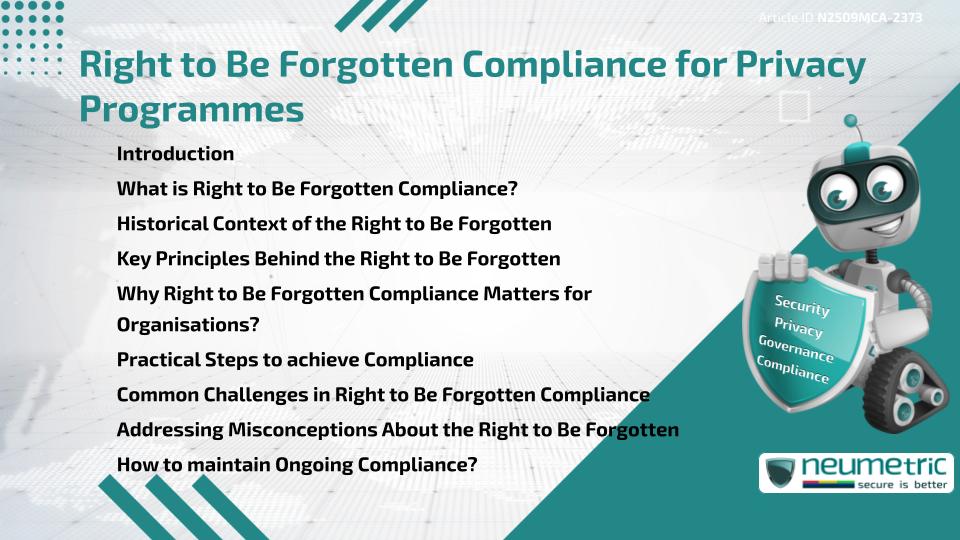Table of Contents
ToggleIntroduction
Right to be forgotten compliance is a critical aspect of modern Privacy programmes. It stems from the principle that individuals should have control over their Personal Data, including the ability to request its deletion when no longer necessary. This compliance requirement, rooted in Data Protection laws like the General Data Protection Regulation [GDPR], ensures that Organisations respect Privacy rights while maintaining accountability. Without right to be forgotten compliance, Organisations Risk legal penalties, reputational harm & erosion of Customer Trust.
What is Right to Be Forgotten Compliance?
Right to be forgotten compliance refers to the processes & safeguards Organisations adopt to handle requests for data erasure lawfully & effectively. It means ensuring that Personal Data is deleted or anonymized when an individual exercises their right, unless there are overriding legal or legitimate grounds to retain it. Compliance involves identifying all storage locations, documenting decisions & maintaining transparency with data subjects.
Historical Context of the Right to Be Forgotten
The concept gained prominence from the landmark Google Spain v. AEPD & Mario Costeja González case in 2014, which established the principle under European law. The ruling confirmed that individuals could request search engines to delist Personal Information under certain conditions. GDPR later codified this right under Article 17, giving it stronger legal authority & broad application across industries. Since then, the right to be forgotten has become a central element in global Privacy discussions.
Key Principles Behind the Right to Be Forgotten
The right to be forgotten rests on Core Principles:
- Data minimization
- Purpose limitation
- Transparency
- Accountability
These principles ensure Organisations balance Privacy rights with business & legal obligations. For example, data may not be deleted if it is necessary for compliance with legal obligations or defense of claims.
Why Right to Be Forgotten Compliance Matters for Organisations?
Compliance matters because it:
- Protects individual Privacy & autonomy
- Builds trust with Customers & Stakeholders
- Reduces legal & regulatory Risks
- Aligns business practices with international Privacy standards
For instance, Healthcare providers may need to comply with deletion requests while carefully ensuring they still meet obligations for medical record retention.
Practical Steps to achieve Compliance
Organisations can take several steps to achieve right to be forgotten compliance:
- Map Personal Data across all systems
- Develop clear Policies for handling erasure requests
- Train Employees to respond promptly & accurately
- Use technical tools to locate & securely delete data
- Document decisions when requests cannot be fulfilled due to legal reasons
This ensures consistency & accountability across the Organisation.
Common Challenges in Right to Be Forgotten Compliance
Challenges include:
- Identifying all instances of data across distributed systems
- Balancing erasure requests with legal retention obligations
- Managing Third Party processors & ensuring they comply with deletion requests
A common misconception is that compliance is as simple as deleting a file. In reality, it requires systemic changes & robust procedures.
Addressing Misconceptions About the Right to Be Forgotten
Some believe the right to be forgotten gives individuals unlimited power to erase all data. In fact, the right is subject to exceptions, such as freedom of expression, legal compliance or public interest. Others assume compliance is only relevant for large corporations. However, Organisations of all sizes must respect & operationalize this right.
How to maintain Ongoing Compliance?
Maintaining compliance requires Continuous Improvement:
- regular Audits of Data Management practices
- Updates to Policies in line with evolving laws
- Periodic training for staff
- Monitoring Third Party compliance
Like other aspects of Privacy management, right to be forgotten compliance is not a one-time project but an ongoing commitment.
Takeaways
- Right to be forgotten compliance empowers individuals by protecting their Privacy rights
- Compliance requires clear Policies, processes & technology solutions
- Challenges often involve balancing erasure with legal obligations
- Ongoing monitoring & accountability are key for sustainable compliance
FAQ
What is the right to be forgotten under GDPR?
It is the right of individuals to request the deletion of Personal Data when it is no longer necessary or when consent is withdrawn, subject to certain exceptions.
Can Organisations refuse a deletion request?
Yes, if there are legitimate grounds such as legal obligations, public interest or defense of legal claims.
How quickly must Organisations respond to a request?
Under GDPR, Organisations must respond within one (1) month, with possible extensions in complex cases.
Does right to be forgotten compliance apply outside the EU?
Yes, GDPR applies extraterritorially, meaning Organisations outside the EU that process EU residents’ data must also comply.
How does compliance affect Third Party processors?
Controllers must ensure processors delete Personal Data when requested & contracts should include obligations for erasure.
Is anonymization the same as deletion?
Anonymization can be an acceptable alternative if data can no longer be linked to an individual, fulfilling the purpose of erasure.
Need help for Security, Privacy, Governance & VAPT?
Neumetric provides organisations the necessary help to achieve their Cybersecurity, Compliance, Governance, Privacy, Certifications & Pentesting needs.
Organisations & Businesses, specifically those which provide SaaS & AI Solutions in the Fintech, BFSI & other regulated sectors, usually need a Cybersecurity Partner for meeting & maintaining the ongoing Security & Privacy needs & requirements of their Enterprise Clients & Privacy conscious Customers.
SOC 2, ISO 27001, ISO 42001, NIST, HIPAA, HECVAT, EU GDPR are some of the Frameworks that are served by Fusion – a SaaS, multimodular, multitenant, centralised, automated, Cybersecurity & Compliance Management system.
Neumetric also provides Expert Services for technical security which covers VAPT for Web Applications, APIs, iOS & Android Mobile Apps, Security Testing for AWS & other Cloud Environments & Cloud Infrastructure & other similar scopes.
Reach out to us by Email or filling out the Contact Form…


